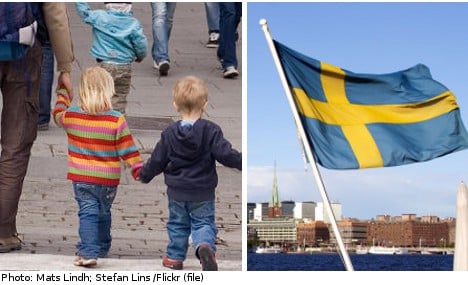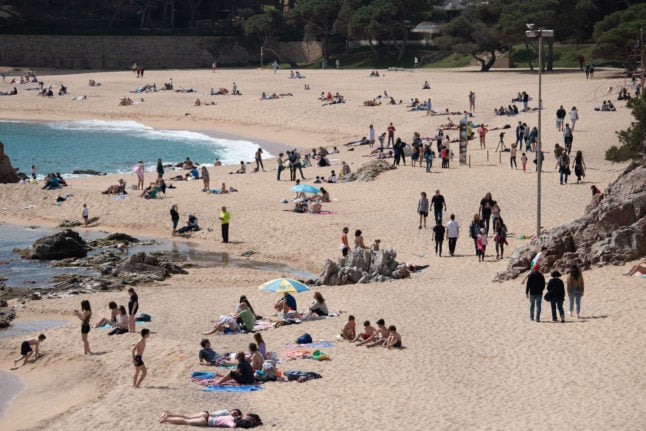Taking the plunge and committing to a new life in Sweden usually prompts many questions from your nearest and dearest back home.
Namely, why are you going somewhere that has such severe winters and a peculiar language that you will be forced to learn in order to properly integrate?
Perhaps more alarmingly, why are you upping sticks for a nation that still broadcasts the Golden Girls, or should I say Pantertanter, at 5am?
Mind you, for all the frustration one might endure learning how to wrestle open a TetraPak carton of milk, there are definite advantages to becoming a faux Swede.
Particularly if you are a “love refugee plus one”, a phase of life during which the benefits of the Swedish welfare state make the case for relocating almost a no-brainer.
Like many fathers-to-be, I willingly followed my Swedish partner back home – in this case to Malmö in southern Sweden – in anticipation of welcoming our first child.
After spending the last few years living in Britain, we decided to divide 2012 between Sweden and my native Ireland once our first born arrived in early February.
Our intention was to know by October at the latest where we were going to live in the long-term. Britain, Ireland or Sweden were our choices, and in true Golden Girls style, we discussed our options into the wee hours over coffee and cheesecake.
Returning to the UK was always an option, especially as my prospects of finding a job as a journalist there would be easier. In Skåne, media jobs are like hen’s teeth, with experienced reporters being laid off and local newspapers requiring bail-outs to survive.
In other words, potential employers are not exactly queuing around the block to snap up an Irish writer with dodgy Swedish.
Moving back to Ireland was briefly considered, even if half the population has been laid off (or emigrated) and the whole country needs the odd bail-out just to keep the place going.
Then there was Sweden, with its tantalizing promises of free healthcare and inexpensive daycare to entice us.
Compare that to Britain, which is ranked second in Europe behind Switzerland when it comes to the most expensive daycare.
There, we were quoted the princely sum of £800 ($1,300) a month. Friends with children in the UK reliably told us that was cheap.
In case you were wondering, Sweden was ranked 27th out of the 31 countries surveyed when it came to expensive childcare, with Britain coming in second and Ireland third. The average British family spends 26.6 percent of their income on daycare, whereas in Sweden it is 4.6 percent.
When you have a new baby to consider, these are factors you have to take into consideration. Or as my father put it rather more bluntly:
“What is the point in going to work just to pay some stranger to raise your children?”
The cost of daycare and lack of family support ultimately ruled out Britain as we edged closer to settling on the country we would call home.
While my native Ireland was still in the running, circumstance soon intervened and the decision to uproot to Malmö for good was made.
On a short visit back to Ireland in mid-April, our two-month old son suddenly took ill.
As any new parent can tell you, it is a frightening experience made all the worse by the eye-watering cost of medical care in my home country.
A visit to the night doctor and couple of nights stay in an Irish hospital cost over €200. And when our son later developed a fever, we were charged a flat fee of €50 just to see a medical professional.
That pretty much sealed the deal – get out of here fast.
Leaving my family behind and removing their day-to-day involvement with a new grandchild wasn’t easy. However, when they were informed of how much better the system for children is in Sweden, they practically offered to buy the ticket for our flight back.
So now we’ve set up shop in Malmö for good.
Granted, daycare and healthcare are top-notch, not to mention the generous paternity leave benefits, especially if you have been working in Sweden.
But that doesn’t mean everything is better in my adopted land.
For starters, finding a first-hand rental lease in Malmö is akin to an act of God, with the situation similar – if not worse – facing new arrivals in Stockholm.
Sure, there are plenty of places in Malmö’s upmarket western harbour, where rents start at 12,000 kronor ($1,780) per month for a two-bedroom apartment, or in one of the suburbs better known for violent crime.
Finding somewhere in-between which is suitable for a young family requires patience and a great deal of luck. But that’s another story altogether.
After a few weeks of our new life in Malmö, we are slowly starting to appreciate what this city has to offer.
There is a free daycare centre a stone’s throw from our flat which is open weekday mornings and welcomes kids ranging from practical new-borns to five-year-olds. It also encourages parents to sing along with obscure nursery rhymes which will surely put off their offspring from ever cropping up on X Factor.
And hey, there is more to this city and indeed Sweden than just a new parents’ utopia.
Practically everybody speaks English, which is both a blessing and a curse if you want to learn the local tongue. In the interim, it at least helps me to practice my profession while I resume my svenska studies.
Finding a home was a struggle and I’ve no doubt the task to find proper work will be just as tough. A daily scan of the employment market generally only yields techy jobs with strange titles.
Why for the life of me I didn’t become a C++ developer, I’ll never know.
Having ruled out a radical career change (for now anyway) the only thing one can do in these circumstances is be resourceful.
Sweden, as I’ve discovered, is a country that welcomes new ideas, and entrepreneurship is encouraged, which fills this new arrival with hope for the future.
Ultimately those of us who decide to build a new life in Sweden have to make things happen for ourselves.
And if you ask me, there is no greater motivation to succeed than the desire to want to create as secure a situation as possible for our infant son.
Due largely to the Swedish way of life, the country’s ample social safety net, and other pro-family policies (did I mention the parental leave thing yet?), those aspirations now feel much more attainable than they might have been in Britain or Ireland.
And if none of that works out there is always another re-run of the Golden Girls to lap up.
Patrick Reilly



 Please whitelist us to continue reading.
Please whitelist us to continue reading.
Member comments